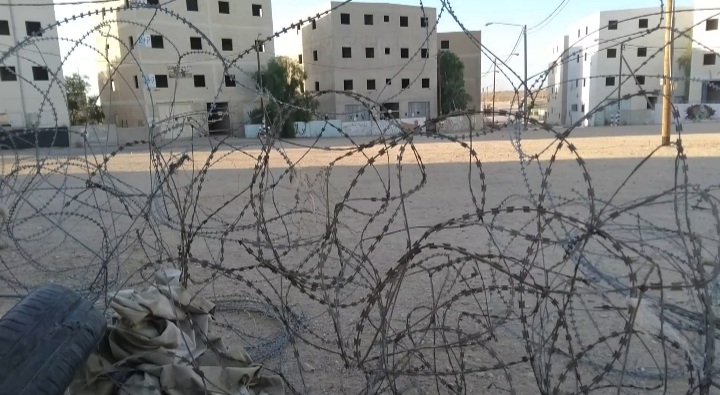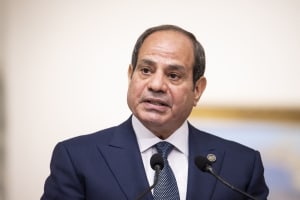International journalists get lesson in battlefield ethics while touring IDF base with 'mock' Palestinian town
The village replica at Tze'elim military base is used for urban warfare training

Over 50 international journalists from foreign media took part in a unique press tour this month at Israel’s Tze’elim IDF military base to be trained in combat and urban warfare, as well as the Israel Defense Forces code of battlefield ethics.
The tour, hosted by Israel’s Government Press Office (GPO), took the participants through an entire replica of a Palestinian village in the Gaza Strip, including mock Hamas-excavated tunnels, used for training purposes.
Christian journalist Paul Calvert was one of the tour attendees and shared his experience with ALL ISRAEL NEWS, which allowed him to photograph and film parts of the tour through the demo town and underground tunnels.
“It is a very impressive structure,” Calvert explained, “and very important for getting soldiers ready for when they have to enter an enemy area and engage in combat.”
The city comprises houses, mosques, a school, and was complete with Palestinian flags and wall graffiti, which can be seen throughout the town, along with a painting of the Hamas terrorist organization’s founder, Sheikh Ahmed Ismail Hassan Yassin.
The base is intended to help soldiers get a sense of a real Arab village, as much as possible, whether it be in Gaza or the West Bank. And to learn how to deal with the environment and which maneuvers to use.
The tour began with an informative lecture on the IDF code of battlefield ethics, conducted by IDF Brig-Gen. Bentzi Gruber.
Gruber fought in five of Israel’s wars, including the First and Second Lebanon Wars, 1982 and 2006 respectively, and also served during Operation Protective Edge during the Israel-Gaza War in 2014. He currently serves as Vice Commander (reserves) of Division 252, an armored division composed of some 20,000 IDF soldiers.

“Gruber’s lecture exposed the very sensitive ethical challenges facing IDF soldiers who are tasked with avoiding collateral damage as much as possible, even while under fire,” Calvert explained. “The lecture and the Q&A that followed provided journalists the opportunity to understand a less known side of the conflict, from a military and strategic point of view.”
Gruber is a worldwide lecturer across the United States and Europe on “Ethics in the Field,” which he established to shatter myths and present facts missing in today’s understanding of Israeli counter-terrorism.
The army general explained that most ground forces come to the Tze'elim base to practice maneuvers. They will learn to physically fight, on the one hand, and to fight with ethics on the other.
He explained that in the Israeli military, reservists make up 80% of the army, while only 20% are young, enlisted soldiers serving their mandatory duty.
“Now is the Israeli army perfect? Gruber began. “No. We make mistakes.”
"To understand ethics, we have to start with the framework. When you are in the field, you have 8 seconds to make a decision. It's not like at home or the university, or at work. You have the time, you can call your friends. But in the field, you have 8 seconds. Shoot or not to shoot.”
“And you are very tired,” Gruber reminded the group of journalists. “In the field, you are carrying very heavy weight. Some soldiers carry more than 120 pounds. Now, when you carry something like that on your back, after four hours you are losing half of your brain. Your IQ is going down by 50%. Now, when you put the helmet on, you’re almost an idiot,” he said, jokingly.
“But that is the time to make those decisions. This is the dilemma. We have to fight; we have to win but to remain human beings.”
Gruber described various aspects of the training drills at the base, having the journalists imagine being on that street, in the presence of the enemy, when it is pitch dark at night.
“You can't see anything. Firing from here and firing from there. You have one soldier here and one soldier there. Now, make a decision!” he told the journalists.
“We have a unit here that plays the enemy and the goal is very simple. We are making the maneuvers and we are making the drills as close as we can to the reality, so if they are in a place like Lebanon or Gaza they will know how to deal with it."
Gruber showed the tour participants a full-scenario video involving terrorists about to carry out a planned terror attack on Israelis. After watching the video, he analyzed and discussed the mock incident and explained how the IDF identifies diversion tactics, strategy and timing and how to act in the most ethical way when dealing with human life.
“In the IDF, you have to ask yourself three questions,” Gruber began. “As an army, you can use force, but this is not an open check. You can use force but only to accomplish the mission."
“So, if you enter a village to arrest a terrorist…destroying the TV in the living room, is that part of the mission? No! If you're doing that you are crossing the line,” he explained.

The second aspect of ethics was the IDF’s permission for soldiers to use force, but only against the enemy, “not against noncombatants or innocent people,” Gruber affirmed.
“Now, that can be very difficult because when you're fighting an army, they are wearing army gear but when you're fighting terrorists they're wearing civilian clothes and they look like civilians."
"Now, if you have a doubt, don't shoot. When you use force, make sure you know that it’s the enemy. Thinking is not enough, and even if you're taking the risk, you have to be sure because maybe it's an innocent guy. If you ever doubt, don't shoot.”
Gruber explained the third aspect of battlefield ethics as being the most complicated of the three, i.e. how to deal with the issue of collateral damage.
“Let's say we have a car five minutes from Jerusalem. We have a terrorist inside the car. We know his name, we know the guy. We have a helicopter in the air. The helicopter could very easily hit the car with a laser rocket, but the pilot says that inside the car, there are five kids with the terrorist.”
“Shoot or not to shoot? That’s what we mean by collateral damage,” Gruber added, because “I'm not trying to hit the kids, I'm trying to hit the terrorist. But I know that if I kill the terrorist, I will hit some of the kids, it's collateral damage.”
Gruber informed the journalists that the IDF permits collateral damage, but only in proportion to the immediate threat, meaning, what is known about the terrorist in that particular moment, not his or her past actions.
“If I know from Intelligence that the terrorist right now has a munitions battery and he's on his way right now to one of the hotels to blow himself up, I will shoot, even though I will kill children,” Gruber said.
He reiterated that the IDF instructs its soldiers not to judge or look at the fact that, for example, this terrorist in front of you killed five Israelis and three weeks ago, another four soldiers.
“The pilot is not a judge,” Gruber continued. “He's not trying to punish someone for what they did in the past, he's trying to avoid terror in the future, so if you have collateral damage without an immediate threat, don't shoot."
Gruber provided another example of a 'mock' military operation involving a driver who is a known terrorist.
“It takes a rocket, from launch, 30 to 50 seconds guided by a laser to hit the target. While the rocket was in the air, the driver went under a building."
"Now, of course, we know nothing about the building. We don't know who is inside, but we can't call the rocket back. There could be a family, it could be full of children, it could be a school.”

Gruber explained how the IDF’s moral code of ethics on the battlefield comes into play in that situation, where life is always more important than equipment.
“So, instead we have to take the rocket to the side, guided by the missile, and let it hit the ground. It's an expensive rocket but we have to do that to save life.”
“Every terrorist organization around the world loves collateral damage," Gruber explained. “They will get great PR: “Wow the Israelis, they kill babies!”
“They will also gain much more support from the community and the support will increase. Then, of course, there will be demonstrations. The cracks will start inside those communities…”
"But the demonstrations won’t be in Gaza," he continued, “The demonstrations will be at the White House and London and at the embassies. And I have seen that in every war I've been in.”
Gruber showed the journalists real footage of a United Nations ambulance, explaining that terror organizations will typically take advantage of international assistance following a conflict.
“They also use ambulances: To bring terrorists, to take terrorists, to move ammunition. This is the difficulty the Israeli army faces, and they are also using children.”
Unlike in Afghanistan where children would run out of the village if the enemy army entered the village, Gruber continued, “Here, the children aren't running out of the village. They're running out into the street. It's the best show in town but among the crowd are the terrorists.”
Again, Gruber explained, the IDF's ongoing dilemma is how to eliminate the terrorists without sacrificing human lives.
“If I use the tank, I would kill many people. So what are we doing? We put snipers on high buildings before the army enters the area. They're trying to hit only the terrorist but the terrorist knows this, so they're taking children and crossing the street with children, so they don't get hit by the sniper.”
“They know the truth,” Gruber said of the terrorists in Gaza. “They know that the army won't fire because of the children.”
"If you are killing civilians, then you didn't fulfill the mission and you didn't achieve the mission. The mission is to fight to win without doing those horrible things."
When facing the choice between property vs. life, the IDF will “destroy property," Gruber responded when asked by Calvert if the IDF uses the unique base for training soldiers to save lives.
“The life of my soldiers is very important, so if the question is, 'Destroy the road because we want to make sure there are no mines on the road to protect my men?' then I will do that. Property is very important but higher is human life.”
Following the press tour of the Tze'elim military base, Calvert told ALL ISRAEL NEWS: “I think there is always more than meets the eye when it comes to reporting on Israel.”
“We need to think and do our research before we can comment. For instance, children were killed in the Jenin fighting just recently. And when you say ‘children,’ you think of a five-year-old playing on their bike in the street."
"But this wasn't the reality,” the journalist explained, adding that three of the four ‘children’ eliminated during Operation Home and Garden were known members of the Hamas terror group.

The All Israel News Staff is a team of journalists in Israel.













